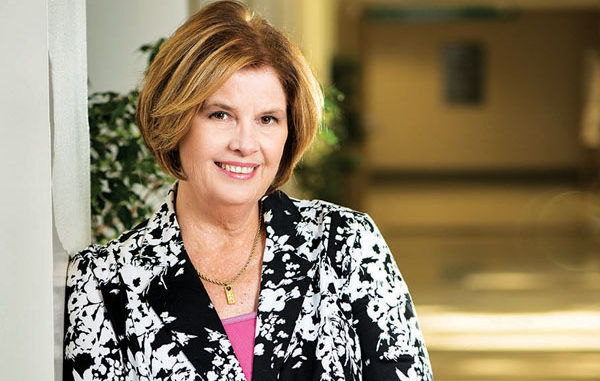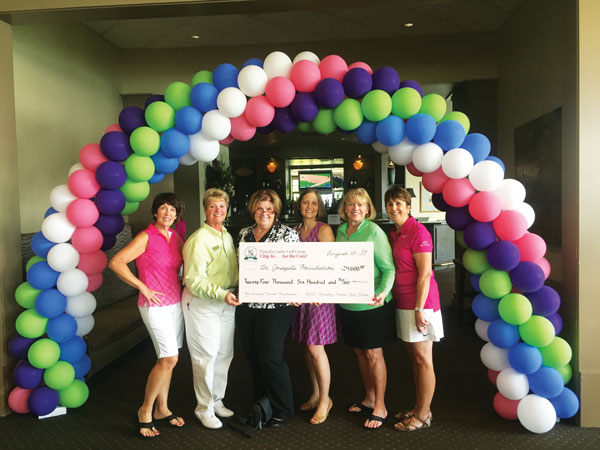
Breast cancer survivor and director of the St. Joseph’s Cancer Institute in Stockton, Charlene Smith uses her personal journey with breast cancer to transform cancer treatment.
Charlene Smith, 58, was diagnosed with breast cancer at age 31. She underwent a mastectomy, radiation, and chemotherapy to treat the disease. Twenty-seven years later and now the Director of St. Joseph’s Medical Center Cancer Institute, Charlene remains cancer-free. But that hasn’t deterred her from helping other women who are diagnosed, especially women who are diagnosed young, like her.
The team at St. Joseph’s has launched several programs to assist breast cancer patients. There are exercise programs including yoga and tai chi, a spa day, networking activities to connect patients, and a navigator program to link patients to helpful services.
“We want patients to know that we’re here for them,” Charlene says. “We’re helping somebody every day and I’ll never want to stop doing that.”
When Charlene was diagnosed, she was no stranger to cancer. A healthcare worker since 15, Charlene got her start in x-ray and radiology. Despite her experience, cancer was still not an easy word to hear.
“Thirty-one is young,” Charlene says. “I’ve seen breast cancer as young as 26 years old and there’s been cases younger than that… it can happen at any time to anyone.”
Charlene’s cancer journey started when she discovered a lump in her left breast while breastfeeding. She waited several months and eventually saw an OB/GYN when the lump didn’t go away. Charlene said it was small and no one seemed concerned. They sent her for a mammogram just in case.
When the results of the mammogram indicated a low likelihood of cancer, Charlene pushed for a biopsy. She’d seen it too many times in her career to let it go. Sure enough, the verdict was cancer, and the mom of three was thrown into her own journey with the disease she’d been treating for eight years.
“It was all just kind of surreal,” Charlene explains. “It was definitely an eye-opening experience being on the table and not the one treating the patient.”
What made the experience most difficult were her three children—ages 12, 4, and 2 at the time of diagnosis.
“Even after 26 years, when I meet a mom I still have to take a breath… you can just see it in their face. They’re worried. And not necessarily about themselves.”
It’s those faces that keep Charlene moving forward. So long after her own diagnosis, the disease is still part of her. She worried when her first daughter got pregnant that she too would find a lump. Then she insisted they both get tested for the BRCA gene mutation. Fortunately, the genetic testing was normal.
“I think it’s really not anything you can explain unless you’re a mom. It’s terrifying because you want to make sure that you’re there to raise your kids.” Charlene feels blessed to have been able to see her children graduate from college, get married, and have beautiful children of their own.
Charlene received treatment locally at St. Joseph’s Cancer Institute. She recalls her husband telling her to go to the best treatment facility, not to simply get treated at St. Joseph’s because she worked there. But Charlene knew that St. Joseph’s was the best option.
Having local treatment options helped Charlene maintain a normal life. During her year of treatment, she did not miss any work. Her coworkers were her doctors and her support team. Charlene also met a survivor and volunteer who taught her to treat the whole person, not just the disease.
“That kind of got me on a journey to help other people I was treating. We’ve started thinking about how we as a cancer institute can treat the whole person, mind, body, and spirit,” Charlene says.
Charlene’s next project is bringing a Survivorship Clinic to St. Joseph’s, a program that would care for survivors for the balance of their life, treating side effects and encouraging follow-up. “It’s hard to let go of it, of the fact that you had cancer and it could come back.”
If Charlene could pass any wisdom onto other women, it would be this: be aware of your body. Get a mammogram before it’s recommended (at age 40) if you suspect there is an issue and advocate for yourself. It could save your life.
“It’s come so far since I had my treatment. In 2017, there are 15.5 million cancer survivors, by 2040 [medical professionals are] anticipating 26 million.”


